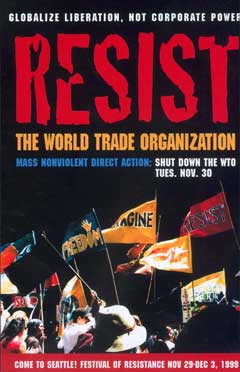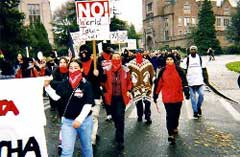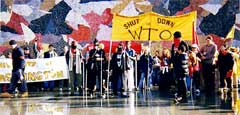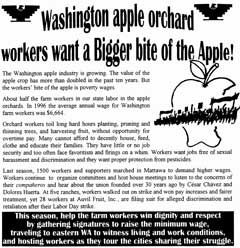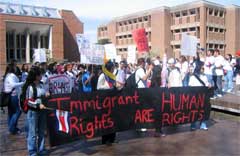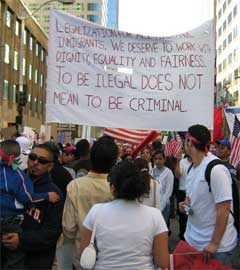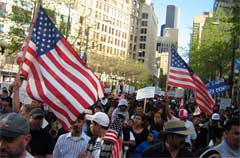Following the victory at Chateau Saint Michelle Winery, the UFW continued not only as a union, but also as an advocacy organization against exploitative state legislature. In May of 1997 Washington State Governor Gary Locke vetoed a bill passed by state legislature that would have provided state sanctioning of substandard housing for farm workers. The veto, pushed by various Latino/a groups, including the UFW, was considered “courageous.”
The UFW also continued with striking activities. On September 1, 1997 more than 150 migrant workers initiated a strike against Auvil Fruit Company in Vantage, Washington to protest unfair working conditions and the flawed bonus-pay system. The workers also protested the intimidation tactics used by law enforcement officials, issuing a press release drawing attention to the role Washington State Patrol and Kittitas County Sheriff officials played in escorting strike breakers onto the work site. The workers noted that there were twenty-six law enforcement vehicles and that officers displayed rifles and shotguns at peaceful protesters. The allegations eventually led to an investigation initiated by the head of the Washington State Patrol. Though the investigation didn’t reveal any “wrong-doing” on behalf of the law enforcement agencies, the strike focused public attention on the role of police in farm labor conflicts.
The following year, on May 27, 1998, a Coalition of five Mexican unions, with the aid of the Washington D.C.-based International Labor Rights Fund, filed a complaint in Mexico City against the Washington State Apple Industry, alleging that the industry had failed to protect the rights of workers to organize, and also failed to protect the health and safety of laborers, leaving them at risk of exposure to pesticides and other carcinogenic chemicals. Three days later, on May 30, 1998, the UFW and Teamsters union picketed outside an historic hearing on the Food Quality Protection Act held at the Yakima Convention Center. The picketers carried signs urging the Environmental Protection Agency (EPA) to enforce laws that would safeguard farm workers’ health.
The UFW’s expanded focus on global justice for workers found another outlet during the WTO demonstrations in Seattle in November 1999. Farm workers by the hundreds marched in the streets with the 40,000 union members and environmentalists who shut down Seattle during the World Trade Organization meeting. After the WTO demonstrations, local protest and strike actions continued as fifty Apple pickers, aided by the UFW, succeeded in a strike against MarJon Orchards near Sunnyside in September of 2000. Despite a job contractor’s attempt to break the strike by bringing an additional fourteen workers from a separate ranch, the failure to meet a certain predetermined production amount forced the contractor to give in to workers’ demands. That same month, striking apple pickers at Flat Top Orchards in Prescott, frustrated over low wages, discrimination, and poor working conditions at Mid-Columbia farms in Central Washington, took their cause to Mexico. Led by the United Farm Workers Union of America, they organized a campaign to inform the Mexican populace of the plight of Mexican workers in Washington State by placing ads in two of Mexico’s largest newspapers, La Jornada and La Reforma. At this time, Mexico was the top export destination for Washington apples.
Most notable of these apple-strike and boycott campaigns was the “Fair Trade Apple Campaign,” launched on August 2, 2001. The United Farm Workers Union of America unveiled its campaign at an 11:00am news conference at Seattle’s Pike Place Market. The press conference would serve as a prelude to a three-mile march and rally in Yakima. The UFW called for cooperation between retailers, growers, and workers, and encouraged growers and agribusiness leaders to sign contracts with workers specifying fair wages and benefits. They also spearheaded an educational campaign to inform and motivate consumers to purchase apples labeled as belonging to the fair trade alliance. The campaign is still continuing as of 2009.
Point of Departure: The Struggle Continues in Washington State
Farm worker struggles throughout the last century, from the IWW campaigns through the early UFW efforts to the Fair Trade Apple campaign have always been about broader issues as well as the immediate needs of farm workers. Today, the question of human rights remains a major concern. This can be seen in the union’s embrace of the Immigrant Rights Movement, which fuses labor, human rights, and cultural empowerment in a way that parallels early Chicana/o Activism.
On May 1, 2006, the city of Yakima witnessed one of the largest demonstrations in its history, the “Day Without Immigrants.” On this day, student activists and community organizers, along with labor and religious groups, helped draw an estimated 15,000 people to the streets of Yakima. The demonstration had a profound impact in the Yakima Valley, now the hub of much of Washington State’s Latino community, as various businesses closed in support of the Immigrants Right Movement. Earlier spontaneous mass student strikes and walkouts also occurred in Yakima, with students at Eisenhower and A.C. Davis High Schools walking out of classes and onto the streets. The students, many the children of farm workers in the Yakima Valley, made a profound statement, visually demonstrating the impact proposed xenophobic legislation (HR 4437, the Border Protection, Anti Terrorism, and Illegal Immigration Control Act of 2005) would have on workers, the community, and their families.1
Nationally, the “Day Without Immigrants” proved to be one of the largest mass demonstrations in U.S. history. Massive marches occurred in Los Angeles (500,000), Chicago (300,000), Denver (75,000), Houston (15,000), San Jose (50,000), San Francisco (30,000 plus), as well as various other communities from New York City to small towns in the Midwest. In 2006, about 7.2 million undocumented immigrants hold jobs in the U.S., 24% as farm workers and 14% as construction workers.[2]
To protest anti-immigrant legislation, large numbers of immigrants and their supporters flexed their economic muscles by refusing to go to work or school on this day, instead taking to the streets. This expression of unity and solidarity among Latino/as living in the U.S. demonstrates the continuing struggle of laborers to defend their rights in this country.
It is no coincidence that the recent reincarnation of “May Day” in the United States fuses a host of different concerns from labor to civil rights. As demonstrated by the UFW in the 1960s, in the Latina/o and Chicano/a community, there are no distinctions between labor issues, civil rights, or immigrant rights. The Washington state UFW and Radio KDNA have long been advocates of all of these issues. Their efforts illustrate that “_La Causa_” is a struggle that is fluid and transcends single-issue causes. In this community, it is synonymous with the universal struggle for the dignity of all who struggle to see a better day, a struggle that has a long and involved history in Washington State among farm workers.
“A History of Farm Labor Organizing, 1890-2009” includes the following chapters:
- Toward a History of Farm Workers in Washington State
- The IWW in the Fields,1905-1925
- The 1933 Battle at Congdon Orchards
- Asians and Latinos Enter the Fields
- Mexican-American Struggles to Organize, Post-WWII
- El Movimiento and Farm Labor Organizing in the 1960s
- UFW’s Yakima Hop Strikes, 1971
- Radio KDNA: The Voice of the Farm Worker
- Resurgence of the UFW of WA State in the 1980s
- The Struggle Continues, 1997-2006
- Bibliography
Copyright (©) Oscar Rosales Castañeda
1 Oscar Rosales Castañeda, “Comite Pro-Amnistia General Y Justicia Social is organized in Seattle in December 1999,” HistoryLink, 29 October 2007. Available online at //www.historylink.org/index.cfm?DisplayPage= output.cfm&file_id=8295.
2 These figures are a result of a study done by the Pew Hispanic Center in Washington, D.C. See “Thousands March for Immigrant Rights,” CNN, 1 May 2006. Accessed online at: //www.cnn.com/2006/US/05/01/immigrant.day/index.html. See also “Nation Sees Effects of ‘Day Without Immigrants,’” NPR, 1 May 2006. Available online at //www.npr.org/templates/ story/story.php?storyId=5373661.

